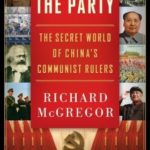 One Sunday last month, China’s leader, Xi Jinping, traveled to a village in the mountains of Sichuan Province. He wore an olive overcoat with a fur collar, which he kept zipped up even when he entered an adobe house to meet with villagers, The New York Times reports:
One Sunday last month, China’s leader, Xi Jinping, traveled to a village in the mountains of Sichuan Province. He wore an olive overcoat with a fur collar, which he kept zipped up even when he entered an adobe house to meet with villagers, The New York Times reports:
“How did the Communist Party come into being?” he asked at one point as he extolled the virtues of socialism. Without hesitating, he answered. “It was established to lead people to a happy life,” he said, and then he added: “That’s what we should do forever.”
Mr. Xi’s remark — specifically its open-ended pledge — suddenly resonates more deeply than before. Barring the unexpected, delegates gathering this week for the annual National People’s Congress in Beijing will rubber-stamp constitutional changes that will enable Mr. Xi to remain the country’s leader indefinitely by eliminating presidential term limits.
 “Chinese politicians value term limits and retirement rules as protection for their security against a leader who otherwise could ruin their careers at any time,” notes Susan L. Shirk, a professor at the University of California, San Diego, in an essay titled “The Return to Personalistic Rule,” which appears in the April issue of [the National Endowment for Democracy’s] Journal of Democracy.
“Chinese politicians value term limits and retirement rules as protection for their security against a leader who otherwise could ruin their careers at any time,” notes Susan L. Shirk, a professor at the University of California, San Diego, in an essay titled “The Return to Personalistic Rule,” which appears in the April issue of [the National Endowment for Democracy’s] Journal of Democracy.
“Although the odds of success for an elite rebellion may be low,” she adds, “the more autocratically a leader behaves the more likely are other politicians to try to bring him down.”
This could thrust the country into a new era of deepening repression and ideology — or greater uncertainty, as the idea of one-man rule, cast off in the late 1970s after decades of atrocities under Mao Tse-tung, returns to the fore, The LA Times adds.
“You have a political system in China in which the party’s legitimacy rests on its being able to deliver a better tomorrow than today, for its citizens,” said Steve Tsang, an expert on Chinese politics at the School of Oriental and African Studies at the University of London. “And that just grows so much harder with Xi Jinping narrowing the scope for internal policy debate.”
 Xi’s authoritarian consolidation is a shock to Western commentators primarily because of “the ideological intoxication and historical amnesia induced by the collapse of Soviet and East European regimes — the blind faith that history had no choice but to move inexorably towards a terminus of Western-style capitalism and democracy,” analyst Pankaj Mishra writes for Bloomberg:
Xi’s authoritarian consolidation is a shock to Western commentators primarily because of “the ideological intoxication and historical amnesia induced by the collapse of Soviet and East European regimes — the blind faith that history had no choice but to move inexorably towards a terminus of Western-style capitalism and democracy,” analyst Pankaj Mishra writes for Bloomberg:
What should surprise us even less is increasing authoritarianism in China, or that economic growth there hasn’t been accompanied by democracy. As the French thinker Raymond Aron wrote in the 1950s, “No European country ever went through the phase of economic development which India and China are now experiencing, under a regime that was representative and democratic.”
Ending term limits will make Mr Xi “an arbitrary dictator, a complete dictator and the world should be alarmed and outraged,” says veteran China watcher Jerome Cohen, from New York University.
It’s a radical departure from the collective leadership and consensus set up by Deng Xiaoping in the early 1980’s that guarded against the dangers of one-man rule and has since delivered stability to China. Mr Cohen said it was designed to stop the excesses of Chairman Mao’s era, which saw “the great leap forward” and “the cultural revolution” that resulted in chaos, destruction and mass death.
Cohen says Mr Xi has dismantled the structures very quickly and this NPC will be the final stage in endorsing China’s new totalitarianism.







